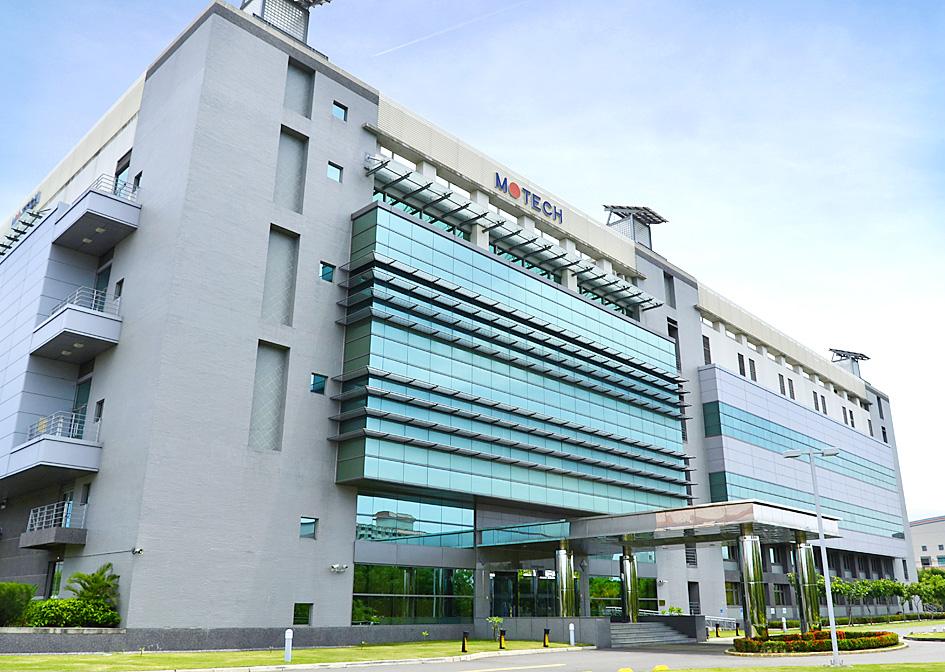Solar cell and module makers Motech Industries Inc (茂迪) and Sino-American Silicon Products Inc (SAS, 中美矽晶) yesterday provided upbeat business outlooks for this year, due to resilient demand for solar module installations in Taiwan and overseas.
Motech Industries said revenue grew in the first half of this year compared with the same period last year, and growth momentum would expand into the second half as its efforts to develop next-generation solar cells have borne fruit, company president Fred Yeh (葉正賢) said in a statement.
The firm has obtained a new order to supply 30 megawatts of N-type solar cells and is stepping up efforts to install new-generation solar cell production lines, Yeh said.

Photo: Chang Hui-wen Taipei Times
The N-type solar cell is expected to offer a better conversion efficiency of 22 percent, exceeding the current industry best, which is 20.6 percent, he said.
Motech Industries said it plans to start shipping N-type solar cells to customers in the fourth quarter of this year.
The company said it has upgraded its solar cell manufacturing equipment in Ma’anshan in China’s Anhui Province, enabling it to make large-sized, or G12, solar cells this quarter, and target Japan’s and Europe’s rooftop solar markets.
The Chinese factory is expected to be fully utilized throughout the year, it added.
Motech attributes its performance to the growth of global solar installations, which are expected to expand more than 30 percent year-on-year to 200 gigawatts this year.
Motech shareholders yesterday approved a planned distribution of NT$0.2 per common share.
The company last year made a net profit of NT$107 million (US$3.6 million), or NT$0.3 per share.
Separately, SAS said it is optimistic about the second half of the year, thanks to robust demand from the home market.
Solar revenue is expected to jump to about NT$10 billion this year, compared with NT$7 billion to NT$8 billion last year, company chairwoman Doris Hsu (徐秀蘭) said yesterday.
To cope with resilient market demand, SAS is expanding capacity at its factories in Hsinchu and Yilan counties, as well as in Germany.
“This year will be a record-breaking year,” Hsu told reporters in an online news conference.
SAS plans to start producing new large M10 solar cells in the fourth quarter.

Intel Corp chief executive officer Lip-Bu Tan (陳立武) is expected to meet with Taiwanese suppliers next month in conjunction with the opening of the Computex Taipei trade show, supply chain sources said on Monday. The visit, the first for Tan to Taiwan since assuming his new post last month, would be aimed at enhancing Intel’s ties with suppliers in Taiwan as he attempts to help turn around the struggling US chipmaker, the sources said. Tan is to hold a banquet to celebrate Intel’s 40-year presence in Taiwan before Computex opens on May 20 and invite dozens of Taiwanese suppliers to exchange views

Application-specific integrated circuit designer Faraday Technology Corp (智原) yesterday said that although revenue this quarter would decline 30 percent from last quarter, it retained its full-year forecast of revenue growth of 100 percent. The company attributed the quarterly drop to a slowdown in customers’ production of chips using Faraday’s advanced packaging technology. The company is still confident about its revenue growth this year, given its strong “design-win” — or the projects it won to help customers design their chips, Faraday president Steve Wang (王國雍) told an online earnings conference. “The design-win this year is better than we expected. We believe we will win

Chizuko Kimura has become the first female sushi chef in the world to win a Michelin star, fulfilling a promise she made to her dying husband to continue his legacy. The 54-year-old Japanese chef regained the Michelin star her late husband, Shunei Kimura, won three years ago for their Sushi Shunei restaurant in Paris. For Shunei Kimura, the star was a dream come true. However, the joy was short-lived. He died from cancer just three months later in June 2022. He was 65. The following year, the restaurant in the heart of Montmartre lost its star rating. Chizuko Kimura insisted that the new star is still down

While China’s leaders use their economic and political might to fight US President Donald Trump’s trade war “to the end,” its army of social media soldiers are embarking on a more humorous campaign online. Trump’s tariff blitz has seen Washington and Beijing impose eye-watering duties on imports from the other, fanning a standoff between the economic superpowers that has sparked global recession fears and sent markets into a tailspin. Trump says his policy is a response to years of being “ripped off” by other countries and aims to bring manufacturing to the US, forcing companies to employ US workers. However, China’s online warriors